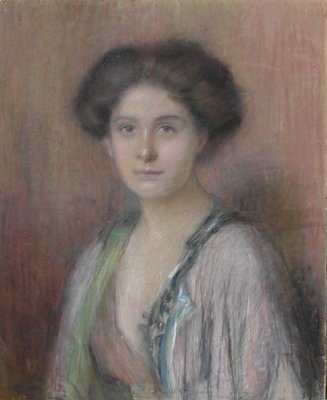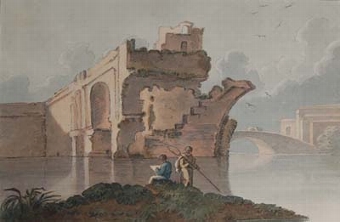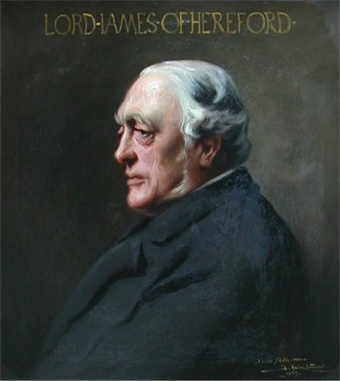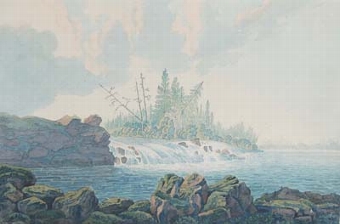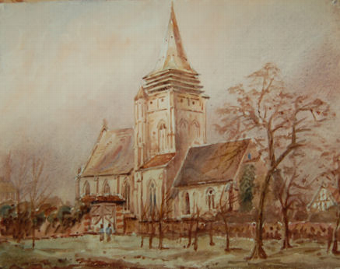Ellen Terry''s oldest child, Edith Craig, would have a symbiotic relationship with her mother throughout her life, ultimately becoming her caretaker and guardian. Like Gordon Craig, Edith''s artistic talents would be put to good use: she was a theatre producer, costume designer and founder of the Pioneer Players; she was also a suffragette and lived most of her adult life with another woman, Christopher St. John, who would edit both Ellen''s The Story of My Life and the Shaw-Terry correspondence. Edith''s relationship with her mother was both complicated and tenuous; she did not suffer fools nor would she temper her what many perceived to be her bruque manner.. However, she was much beloved in her circle of theatrical friends and did much to perpetuate Ellen Terry''s memory following her mother''s death. Edith Craig is also reknown for living in a m?nage a trios with both the writer Christopher St. John (formerly Christabel Marshall) and the artist, Clare ("Tony") Atwood from the mid-teens until her death in 1947. Of this unusual relationship, Shaw would write to "you really must write of that menage". While this did not come to pass, St. John herself did much to solidify Terry''s literary reputation editing the Terry-Shaw correspondence and annotating the 1931 reprint of Terry''s The Story of My Life. The following biography is St. John''s introduction to Edy, Recollections of Edith Craig, a collection of essays published to honor Craig two years following her death.
Christopher St. John: Edith Ailsa Geraldine Craig, daughter of Ellen Terry and Edward William Godwin was born on December 9, 1869, at Gusterwoods Common, Hertfordshire. Shortly after her birth, her parents moved toad house at Harpenden, built by Godwin, a distinguished architect, archaeologist and pioneer in the reform of domestic furniture and decoration as well as in that of stage scenery and costumes. Here, Edy, as she was known from infancy, and her brother Teddy (Edward Gordon Craig, born in January 1872) lived until 1874, when Ellen Terry''s retirement from the stage came to an end. Edy had many different homes in or near London after that date, among them a cottage at Hampton Court, a house in Longridge Road, and another in Barkston Gardens, which was Ellen Terry''s headquarters during her long partnership with Henry Irving at the Lyceum. Edy was educated at a co-educational school in Earl''s Court, kept by Mrs. Cole, who numbered among her many talented pupils Walter Sickert and Sir Walter Raleigh, and later at Dixton Manor near Winchcombe in Gloucestershire by Mrs. Cole''s sister, Mrs. Malleson, one of the pioneers of Women''s Suffrage and kindred reforms.
Edy made her first appearance on the stage in 1878 during the run of Olivia at the Court Theatre, but her future career was not then decided. After leaving school, she went to the Royal Academy of Music, and thence to Berlin to be trained as a pianist. The doubtful question that this was her vocation was settled by her life-long enemy, chronic rheumatism, and she returned to England and the stage, becoming a regular member of the Lyceum company in 1890. She played a great number of small parts in Irving''s productions during the next ten years, and gained further experience as an actress on tours with Mrs. Brown-Potter, and the Independent Theatre (1897). In 1899, Irving employed her to make the costumes for his production of Robespierre and this led to her going into business as a dressmaker. Although her atelier in Covent Garden was well patronized, it was more successful artistically than financially and had a short life. After Ellen Terry left the Lyceum and went into management, Edy accompanied her on her tours in the English provinces and America as her stage-director, and from that time play-production became her chief occupation.
Between 1911 and 1921 she produced 150 plays for the Pioneer Players, Sunday coterie theatre she had founded. After its demise, she found scope for her talents in Little Theatre movement, producing plays at York, Leeds, Letchworth and Hampstead. In 1929, the year after Ellen Terry''s death, she converted the Elizabethan barn adjacent to Ellen Terry''s house at Smallhythe, which largely through her influence and efforts had been acquired as a memorial, into a theatre. There, in addition to the Shakespeare performances given every year to commemorate the anniversary of Ellen Terry''s death, eddy produced plays at intervals during the summer months for the Barn Theater Society she had organized on the lines of the Pioneer Players. Her other activities comprised the production of pageants, a few appearances in film, and a scholarly collection of scrapbooks and notebooks, which may serve as valuable data for some future historian of the theatre. It should be mentioned too that in collaboration with the author of this note, she revised her mother''s memoirs, completing them with a short biography, and that it was at her suggest that the Terry-Shaw correspondence was published. She died unexpectly at Priest''s House on March 27, 1947.
While Edy would have a sometimes contentious relationship with her brother, particularly over what he perceived as a betrayal of his mother''s memory wiith the publication of the Terry-Shaw letters, in his remembrance "Edy Playing", Edward Gordon Craig recalls the curious dynamics of the mother-daughter relationship.
Edward Gordon Craig: How to write of Edy - and what? Of the nice tilt of her nose - or of her dancing - or her way of playing the piano?
I can so often hear her playing the piano now, that I could write on and on about this, foregetting that it can only interest me or my mother , since we two were always present when Edy began to play. So only a word or two. I though she played splendidly. My mother, who could and couldn''t play, knew what it was to attack a difficult piece of music, and they often played together. When mother attacked, she was resplendent, and Edy gave up. Duets they played - and Edy, despairing to improve my mother, took to arguing; and the pierce torrent of music ceased and logic took its place. Edy uttererly annihilated Mother with her logic: she explained that if a piece was written to be played slowly and with such and such emphasis, it was not being politie to the composer, especially if his name was Brahms, to . . . Here Mother peered at the music to see the name of the celebrated being: "Yes - it is Brahms." All this gently murmured while Edy''s scathing logic marched on. At the end of the speech, Mother would say: "Let''s try it again." . . . And again Mother dashed in and on, and Edy came following after. Again a traffic jam. "What''s the matter?" "Twice too fast," said Edy . . . And the funny thing was she was right and Mother couldn''t believe her own daughter''s ears. "Once more!" cries Mother. And this time Edy only pretended to play and let E.T. go ahead as fast as she liked - to the end of the piece.
George Bernard Shaw: Did I say "find an opening for Edy"? I apologize, I withdraw. I abase myself - you wretch: that was precisely what you ordered me to keep my eyes open for. She wants an opening ten times more than if she had no mother. Do you remember - or did you ever hear of - the obscurity of Mozart''s son? An amiable man, a clever musician, but hopelessly extinguished by his father''s reputation. How could any man do what was expected from Mozart''s son? Not Mozart himself even. Look at Siegfried Wagner. Ellen Terry''s daughter! Awful!"
While Christopher St. John never took Bernard Shaw up on his challenge to write about the menage of women at Priest''s House, the two excerpts from Edy give insight into life at Smallhythe and Edy''s personality both theatrical and otherwise.Vita Sackville West: It is enchanting talk: it ranges widely; it isn''t always consecutive; it starts too many hares too quickly to follow up; they argue; they quarrel; they interrupt; it is impossible to have any sequence of conversation. Yet how stimulating it is! and how friendly! how lively! What live wires they all are; what a sense of life one gets from them. Tony may be a peacemaker; but Edy is a pace-maker. She rushes the other two; she has too many ideas for them; ideas that that they must put into practice. No wonder that they sometimes say ''Edy has bitten off more than we can chew.'' For, let us be honest, Edy is a tyrant, and the other two must obey her commands. Edy sitting in her big chair under the dim mirror, is the dominating character, the matriarch of this encampment.
Clare ''Tony'' Atwood: Edy always had a pencil and it always had a point. She amassed a very fine collection of pencils of every sort and she also collected india-rubbers. One bright moonlight night, when the Tenterden fire-engine dashed down the road to Tittersham, a new solid tyre burst into fragments. Edy was watching the proceedings from her bedroom window and instantly her collector''s instinct sprang to attention. "Tony! Go and pick up as much as you can of that rubber!" A good hateful was the result, and for many years to come there may be serviceable lumps of rubber available among her belongings . . .
One of the sights I loved best was to see Edy "dress" the stage. Only once did I see her worried and really perturbed about an interior set; it needed something to pull it together and that eluded her. Suddenly she sang out from the stalls, "Go and fetch that heap of red draperies from my dressing room." Down it came and up went Edy on the stage. Taking a great armful of material, with one swift movement, she flung the lot on to the top of a tall piece of furniture, where it lodged, hanging down it graceful folds. It made the scene.
Dame Sybil Thorndike: It was during her Pioneer Theatre days that I came under her production, the most memorable thing being her production of The Hostage by Paul Claudel . . . I remember arriving for the first rehearsal at Edy''s flat in Bedford Street, full of beans, loving the words of the play even when I didn''t know what on earth they mean, but dashing at them in the forthright way one dashed at Shakespeare, hoping that verve and nerve would carry through, then being laid completely low by Edy, who could "scathe" as few people know how. I came out after a good day''s at the play and crept to the Old Vic for my evening performance feeling the size of a round little worm, instead of Miss Bounce, eight feet tall and clever to boot! But with her scathing and her mocking discouragements came a bigger thing - a sense of beauty hidden, waiting to be unfolded . .
Edith Ailsa Geraldine Craig, daughter of Ellen Terry and Edward William Godwin was born at Gusterwoods Common, Hertfordshire. Shortly after her birth, her parents moved at Harpenden, built by Godwin, a distinguished architect. Here, Edy, as she was known from infancy, lived until 1874.
Edy had many different homes in or near London after that date, among them a cottage at Hampton Court, a house in Longridge Road, and another in Barkston Gardens. Edy was educated at a co-educational school in Earl''s Court, kept by Mrs. Cole, and later at Dixton Manor near Winchcombe in Gloucestershire by Mrs. Cole''s sister, Mrs. Malleson, one of the pioneers of Women''s Suffrage and kindred reforms.
Edy made her first appearance on the stage in 1878 during the run of Olivia at the Court Theatre, but her future career was not then decided. After leaving school, she went to the Royal Academy of Music, and thence to Berlin to be trained as a pianist. The doubtful question that this was her vocation was settled by her life-long enemy, chronic rheumatism, and she returned to England and the stage, becoming a regular member of the Lyceum company in 1890.
She played a great number of small parts in Irving''s productions during the next ten years, and gained further experience as an actress on tours with Mrs. Brown-Potter, and the Independent Theatre (1897).
Between 1911 and 1921 she produced 150 plays for the Pioneer Players, Sunday coterie theatre she had founded. After its demise, she found scope for her talents in Little Theatre movement, producing plays at York, Leeds, Letchworth and Hampstead. In 1929, the year after Ellen Terry''s death, she converted the Elizabethan barn adjacent to Ellen Terry''s house at Smallhythe into a theatre.
There, Eddy produced plays at intervals during the summer months for the Barn Theater Society she had organized on the lines of the Pioneer Players. Her other activities comprised the production of pageants, a few appearances in film, and a scholarly collection of scrapbooks and notebooks, which may serve as valuable data for some future historian of the theatre. She died unexpectly at Priest''s House.
Antiques.co.uk Ref: JARDXEYG
- Materials:
- Pastel Drawing
- Width (cm):
- 58.42 x 48.26cm, (23 x 19ins)






